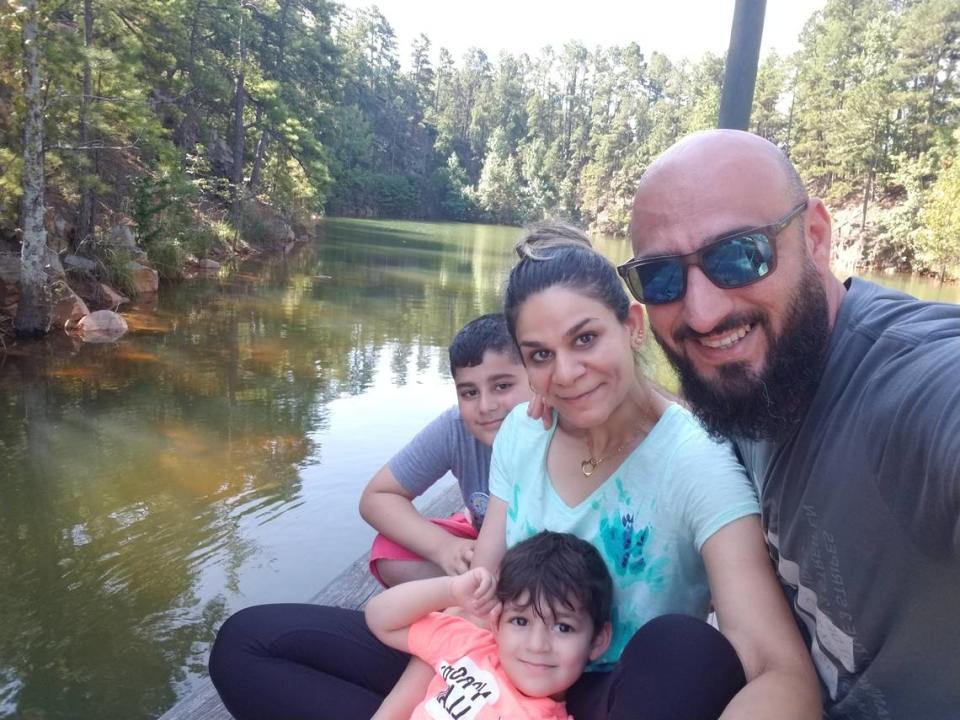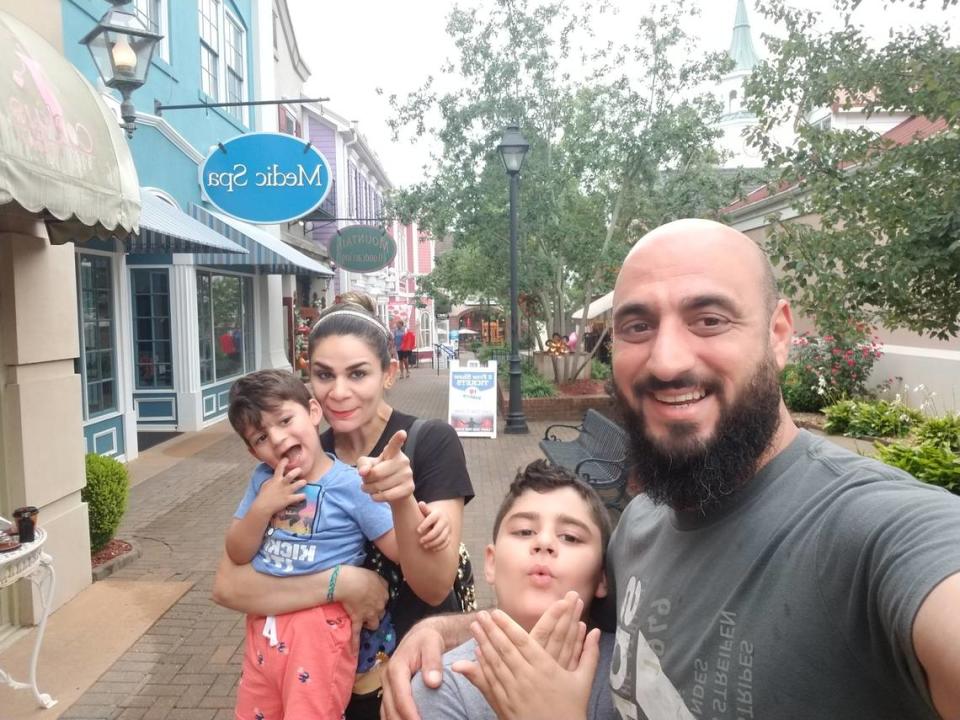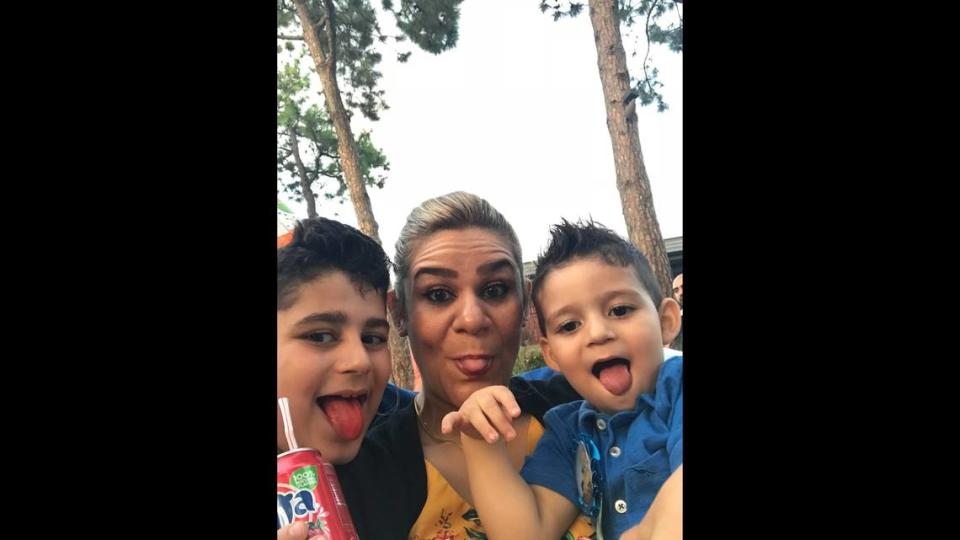She survived death threats in Iraq, then died in possible drunk-driving crash near KC
Some nights, Saif Mhadi is still up fighting tears. But almost every night, he sings a song his late wife Noora Al Mafraji would sing to her son at bedtime.
The song reassured the young boy of his strength and the unconditional love his mother had for him. She was many things, Mhadi said, and no one quality could define her. But above all, Noora Al Mafraji was a devoted mother, hard worker and friend.
Al Mafraji was killed in a wrong-way crash in the Kansas City metro area on Christmas Eve on the way home from work with her husband. The wreck happened just as they got onto U.S. Highway 71 when a suspected drunk driver hit their car.
Ten years before the crash, Al Mafraji and her family fled a war-torn Iraq, escaping death threats and armed militias. They left their home country in pursuit of becoming U.S. citizens — to rebuild their lives and raise children in a place that had become their sanctuary.
That sanctuary was destroyed by a suspected drunk driver.
The loss was sudden. And, months after, there is a void left in the lives of those who loved her — and who she loved so deeply, Mhadi said.
“When I sing it to him, the problem is I can’t hold myself because I’m crying for him,” he said.
Fleeing a war torn country
Al Mafraji, the second child in her family, lost her dad when she was in middle school. Her family lived in Iraq, and most of them still do. She was a good student, Mhadi said. They don’t have letter grades there, but she earned 94/100, making her an A student.
After graduating college, Al Mafraji began working at the same subcontractor agency where Mhadi was a project manager. Al Mafraji was a translator with the agency, which worked with the U.S. Army during the Iraq war.
The first time Mhadi met her, Al Mafraji came to him with a technology issue. He wasn’t looking for a relationship, so he didn’t think much about the interaction, until she kept coming back.
“She told me from this time, ‘I said I want this guy,’” Mhadi said. “And she kept coming around me and asked me if I needed food. We love food there, every day she made food.”
At the time, because of the war, it was dangerous to commute for work. So the agency prepared a room for Mhadi to stay in. And he only saw his family a few times a month. Then it became a couple times every two months.
When Mhadi told her this, Al Mafraji insisted on providing him meals.
“It’s very scary there,” Mhadi said. “And when she knew that I was living at the agency, she started making me food.”
There are many memories that stick out about Al Mafraji, but how they first met is still replaying in his mind months after her death.
“I have many memories with her,” Mhadi said. “It’s bad and good. But it’s memories. That’s what I have.”
Al Mafraji and Mhadi married in 2008 and kept working in close proximity for years.
After her contract work with the Army, Al Mafraji moved on to work with International Relief and Development (IRD), a nonprofit organization which at the time was created to help rebuild countries and quell insurgencies after the U.S. invasions of Iraq and Afghanistan.
This was the work she was most passionate about, Mhadi said. But together, their work put them in dangerous situations.
They faced constant threats from militia groups. They received death threats and phone calls and messages with vulgar and demeaning statements. One group burned Mhadi’s car.
Constant stress put a strain on their health and Al Mafraji had a miscarriage. Almost daily, they feared for their lives, he said.
“They tried to kill her many times, they threatened her,” Mhadi said about the militia groups.
Eventually, they decided they had to leave Iraq. Choosing to leave behind their families was a hard but necessary decision, Mhadi said. After burying two of his friends who were killed in bombings, he made a plan for the couple to come to America.

A better tomorrow
Through a U.S. Army program that helps people who worked with the military, Al Mafraji and her family were able to flee to Jordan for a year, then move to Spokane, Washington, in September 2014 in pursuit of their goal of becoming U.S. citizens.
When they came to the U.S., they knew about coastal states like California and Florida from movies. But their priority was finding a safe, quiet area to raise their kids, Mhadi said.
“I found the midwest area is the best area for us to raise kids,” he said.
Mhadi is a graphic designer at heart, having honed the skill while managing media publications at the agency in Iraq and freelancing for companies like Thomson Reuters before and during the war. But when they first moved to the U.S., it was hard to find jobs.
He worked as a dishwasher, a barber, bartender and other jobs while they made a plan to come to the Midwest. Eventually, they settled near the Kansas City metro. In 2022, they became U.S. citizens.
Al Mafraji worked at Carter’s Oshkosh part-time, and eventually worked her way up to be a top salesperson at the store. She enjoyed having a flexible schedule to be with their two children, Yazin and Nezar.
“We like to say that she was our sunshine,” said Beth Fulbright, manager of the store. “She was also really genuine, there wasn’t anything forced or unnatural about her.”
Al Mafraji won many staff awards and became the second best sales person in Missouri. It surprised Mhadi how naturally sales came to her, when he had to read and study the art of sales thoroughly in his own time for his freelance work.
“She didn’t know a stranger. Everybody was her friend,” said Jessica Haynes, a coworker at Carter’s.
In many ways, Al Mafraji was the glue of the family, Mhadi said. She took care of logistics like planning doctors appointments and shopping for school supplies, clothes and food. She took pride in helping others realize their own talents and had high expectations of everyone.
After moving to the U.S., she made a point to participate in the culture and traditions of her new country, and found joy in celebrating holidays like Thanksgiving, Independence Day, and Valentine’s Day.
“My son told me Valentine’s Day was coming up and that we need to get cards, and I asked him, ‘What does that mean?’” Mhadi said.
His oldest son, Yazin, used to help Al Mafraji with these kinds of traditions, so he went to the store with him this year to pick out the cards. Mhadi said he’s not a religious man, and he doesn’t care about traditions as much. But something about life in America made Al Mafraji passionate about participating in American traditions, which he’s now trying to carry on in her memory.
“From my side, I don’t believe in religions, from her side, she’s Muslim. And we respect each other,” Mhadi said.
Fulbright said Al Mafraji was always looking for ways to give back to others and holiday seasons and traditions were always an important part of that.
Around Christmas, Al Mafraji would wait for pajamas to go on sale at Carter’s and get as many as she could within a budget and donate them to Children’s Mercy Hospital.
“That was just something she did every Christmas, quietly,” Fulbright said. “At first, she didn’t share what she was doing and then we were like, ‘Noora, these aren’t your kids’ sizes, what are you doing? And so she told us.”

‘Always doing more’
“She had something, some talent, some gift from God,” Mhadi said. “And if people would say, ‘Who is this woman, superwoman?’ No, she really is superwoman.”
Together, Al Mafraji and Mhadi raised two children. Yazin, who is 14, takes after his mother and is a straight-A student. He plays viola and was a captain on his football team. Al Mafraji wanted him to become an engineer.
Nezar, 7, is their youngest son. He’s in a gifted program in school and Al Mafraji always saw him as a lawyer because of how much he likes to talk, Mhadi said.
Another fond memory he has is when she would smile while helping their children. He remembers that she was always smiling, even when things were hard.
Her daily schedule didn’t revolve around herself, but others, Mhadi said. She would wake up at 4 a.m. to exercise, then come home to help her children get ready for school. After work, she would come home and help them with their studies.
She coordinated school activities for the children and made time to do other volunteer work. And she did it all over again the next day. From dawn to dusk, Mhadi said, she was devoted.

“She’s really my friend,” Mhadi said.
“It’s very difficult, every night still up crying because— she really made my life easier,” Mhadi said.
Al Mafraji would sing to Nezar in Arabic. The lyrics of her song don’t translate well to English, Mhadi said, but the melodic poem tells Nezar he is beautiful and beloved and that he is filled with purpose.
In her absence, it is hard to explain her death to Nezar, Mhadi said. He wants to go see her, and all he can say is that she is up in the sky and they will have to see her later.
“Nothing was about her, everything was about her family,” Mhadi said. “She was always doing more.”
“If you ask her to make cookies, she will make three kinds of desserts. If you ask her to save $1,000, she will save $5,000.”
The life Al Mafraji led motivates Mhadi to honor her in the way they live their lives. That’s his goal now, he said.
“We dedicated our life and our time to our family and our work,” Mhadi said. “And that’s what we’ll keep doing.”
“Keep going and… dream, because that’s what feeds your soul,” Mhadi said. “Noora lived that.”

